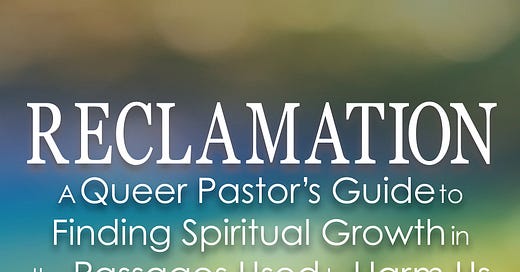In 2022, I published my first book Reclamation: A Queer Pastor’s Guide to Finding Spiritual Growth in the Passages Used to Harm Us. The past few years have been a wild ride. I’ve had the opportunity to share this work with churches all over the country, to lead workshops at conferences on how to teach these lessons in congregational settings, and have stumbled upon websites of people recommending my book to folks. It’s been surreal to be honest.
Some of you who follow my work are doing so because of the book or one of the related workshops I’ve led over the past two years. For those who are new to this space and my work, I wanted to share my motivation behind the book, as that’s ultimately what led me to launch Queer Faith.
Over the past several decades, many people have done fantastic research into the “clobber passages”-- the handful of passages that conservatives cherry-pick and misinterpret in order to justify their mistreatment of LGBTQ+ people. The documentary 1946: The Mistranslation that Shifted Culture does a great job describing how the word “homosexual” was added to English translations of the Bible, why that word is a mistranslation, and how the mistranslation became so widely disseminated.
Other important works do the work of “unclobbering” the clobber passages, highlighting that those passages have nothing to do with being gay.
All of that work –as incredibly important as it is– left me, well, unsatisfied. For the most part, the conclusion of the scholars I read was “these passages aren’t about gay people, so don’t use them to hurt gay people.” That’s it. From that perspective, there’s not really a reason to bring them up in church; they become the Bruno we don’t talk about.
Was that really the best we could do? Basically remove these verses from our own personal lectionaries? Never address them from the pulpit? Or, in the few times they come up, just respond with “they aren’t about gay people” and leave the conversation there?
Surely, we could do better than that. From that dissatisfaction, I began to wonder what would happen if someone used their conclusion as a starting point.
Inspired by that thought, I formed a deeper question: Once we remove the lens of homophobia through which we were introduced to these verses, what might they have to teach us about living lives of faith?
That question is the foundation of Reclamation. Throughout the book, I strove to stay away from queer apologetics and dig deep into queer thriving. As I researched the clobber passages through that question, I found that these texts have much richer things to teach all of us– no matter how we identify.
For example, how might we treat the LGBTQ+ folks in our lives if we understood the Sodom and Gomorrah story as a lesson on the consequences of treating visitors with hostility instead of hospitality?
How might we grow as leaders if we understood Romans 1 as an indictment of exploitative leadership practices?
These verses have many things to teach us –things that are in line with other things Jesus taught throughout his life and ministry– if we’re willing to engage them in a new light.
I’m hoping to put some events together later this year that dig deeper into how to teach these passages in church or small group settings– so be on the lookout for announcements. In the meantime, if this sounds like something you want to learn more about, I invite you to check out my book. It’s available wherever books are sold (Amazon, Barnes and Noble, etc), or you can get it directly from me or my publisher.
If that’s not your cup of tea or feels too painful to dig into, that’s totally fine. Use your discernment to identify what are the right resources for you at the right time. There’s no cookie-cutter formula for healing from the damage these wrongfully-weaponized verses have caused. You deserve to be gentle with yourself on your path to healing.




